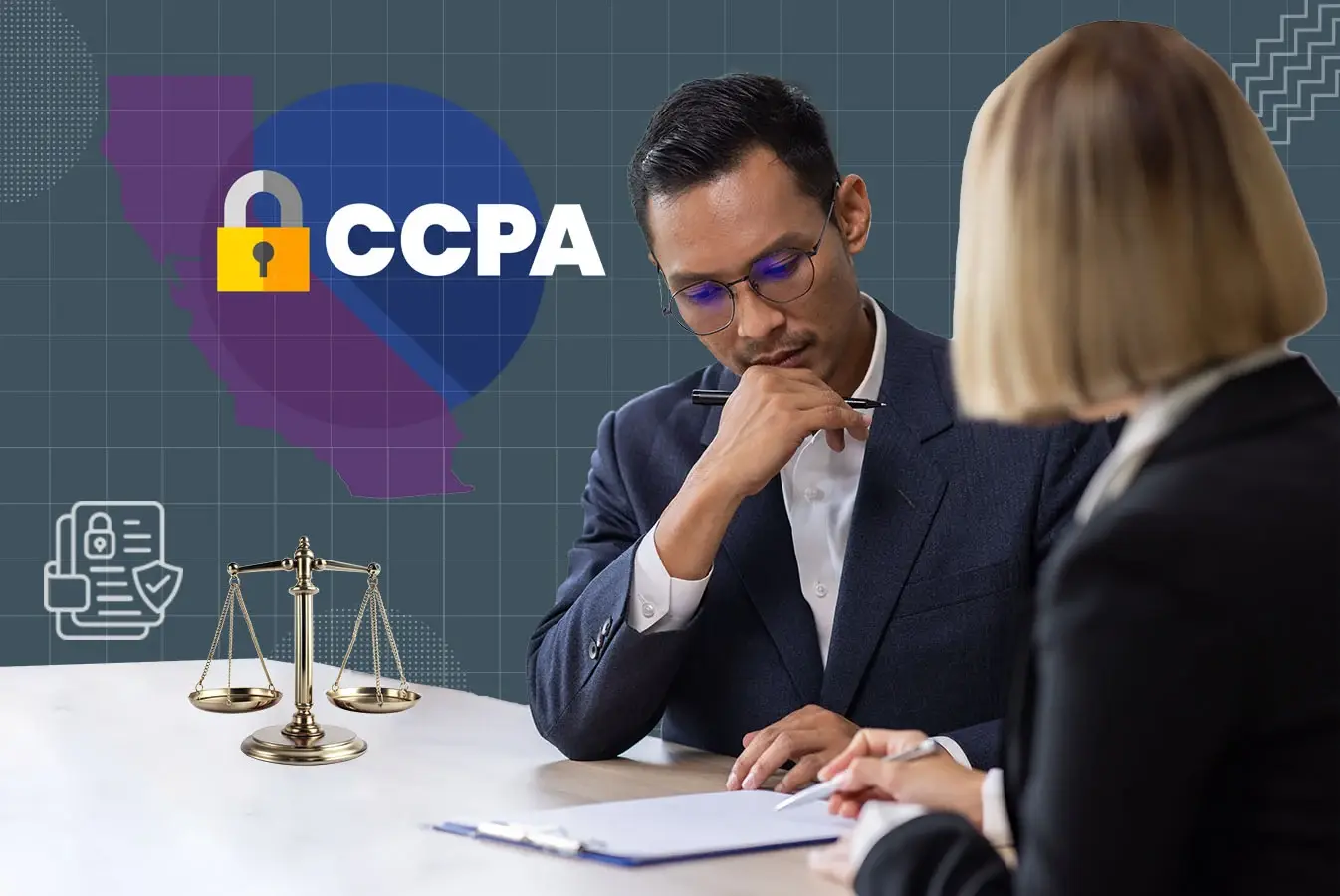CCPA Compliance & Data Privacy Explained for Businesses
by VIDIZMO Team, Last updated: June 11, 2025, ref:

The California Consumer Privacy Act (CCPA) gives individuals control over how businesses collect, use, and share their personal data. This blog outlines CCPA requirements, consumer rights, penalties for non-compliance, and how tools like VIDIZMO Redactor support organizations in achieving compliance.
Due to numerous consumer data breach incidents, countries have enforced mandatory privacy laws for private companies and organizations handling consumer data in recent years. These laws require compliance with data privacy standards to ensure that such entities protect consumer information.
According to a study by Camparitech:
California suffered the most data breaches and had the most records exposed: 1777 breaches since 2005, affecting nearly 5.6 billion records.
Privacy laws are essential in safeguarding individuals' personal information and granting them control over how their data is collected, used, and shared.
Understanding California Consumer Privacy Act (CCPA)
Before we go into the details of CCPA, let's first understand what CCPA is and to whom this applies.
California Consumer Privacy Act (CCPA) is a data protection regulation enacted on June 28, 2018, that provides individuals with solid rights and protections around their data access and collection.
In simple terms, CCPA grants Californian consumers the right to request access to their personal information held by a company and obtain a list of third parties with whom their data has been shared. Consumers can sue companies for infringing privacy guidelines even without a data breach.
So, you might wonder, does the CCPA apply to all the California companies that collect and sell consumer data?

CCPA was introduced to safeguard customer data and make entities responsible for what they did with it and with whom they shared information. Consumer data includes names, addresses, social security numbers, driver's licenses and anything that constitutes personally identifiable information (PII).
Rights of Consumers under CCPA Legislation
CCPA Legislature provides consumers rights related to their data which are as follows:
- Right to Know: Consumers can ask a company to disclose the categories and specific personal information they have collected about them.
- Right to be Forgotten: CCPA legally mandates companies to delete personal data and information upon consumers' requests.
- Right to Opt-Out of Sale: Consumers can request that a company does not sell their personal information to third parties, known as the right to opt-out.
- Right to Access: Consumers can access their personal information held by a company.
- Right to Fair Treatment: Consumers have the right to fair treatment, ensuring that businesses cannot discriminate against them for exercising any of their rights under this title.
The CCPA also grants consumers the right to sue the company for civil rights violations if it fails to redact their personal information correctly. It is present in clause 1798.150, which states the following:
"(a) (1) Any consumer whose nonencrypted or nonredacted personal information, as defined in subparagraph (A) of paragraph (1) of subdivision (d) of Section 1798.81.5, is subject to an unauthorized access and exfiltration, theft, or disclosure as a result of the business's violation of the duty to implement and maintain reasonable security procedures and practices appropriate to the nature of the information to protect the personal information may institute a civil action."
You can learn more in our Blog: What Do the California Rules of Court Have to Say About Redaction?
Penalties for Non-Compliance
The repercussion of non-compliance leads to heavy penalties for companies. Failure to comply with CCPA within 30 days following state notification constitutes a violation of the law, subjecting the company to civil penalties of up to $7500 per violation. A significant data breach for a company with thousands of customers in California can escalate to a $1 million CCPA penalty.
Why is there a Need to Protect Consumer Data for Businesses?
The face pace digitization of the world and the advent of the internet have exposed your personal information as you use different websites and buy things online. Social media platforms also collect user data for targeted advertising, resulting in ads related to products appearing on your feeds.
It has raised some serious issues related to the unauthorized disclosure of personal information. Personal data, such as names, social security numbers and financial details, can be used for identity theft and fraud. Protecting such data helps prevent these malicious activities.
Businesses are ethically responsible for protecting customers' privacy and treating their data respectfully. Prioritizing data protection demonstrates responsible corporate behavior.
Data breaches in the first quarter of 2023 exposed more than six million records worldwide. Since the first quarter of 2020, the highest number of exposed data records were detected in the fourth quarter of 2020, nearly 125 million data sets.
Therefore, businesses in California should look for solutions that would help them to redact PII and ensure smooth compliance with CCPA.
Redaction tools available in the market can help to redact PII from images, videos, documents, and anywhere it is deemed to do so.
Companies must look for modern redaction software with AI-enabled redaction capabilities because manually redacting massive volumes of digital files is practically unrealistic and inefficient.
Moreover, they must look for software with high-level data security standards and encryption features because consumer data is sensitive and personal.
Stay Compliant with CCPA Using VIDIZMO Redactor Tool
VIDIZMO Redactor tool can help companies to ensure compliance with CCPA with its efficient redaction functionalities. It has an intuitive, easy-to-use interface that will help companies swiftly navigate and streamline their redaction process.
The tool helps in protecting privacy at the highest level with top-level security features, including FIPS 140-2 end-to-end encryption and more.
Some of the key features of the VIDIZMO Redactor tool that can help companies in compliance with CCPA are as follows:
- It is an AI-powered redaction tool that automatically detects and redacts faces, vehicles, license plates, weapons and other custom objects from images and videos.
- VIDIZMO Redactor also supports audio redaction that can help to bleep or mute specific spoken words in audio clips that contain PII, protecting consumer privacy in audio recordings.
- With VIDIZMO Redactor, you can redact sensitive information within documents. It allows you to swiftly search for specific words or phrases containing PII using keyword search or regular expression patterns to find numbers with specific patterns, such as phone numbers and social security numbers.
- With its document redaction feature, you can easily safeguard sensitive information by redacting any text that highlights confidential data within your documents. This is how you can keep information secure and private within documents too.
These are some of the notable features of the redactor tool that businesses can leverage to streamline their data protection efforts and ensure compliance with privacy regulations.
Stay CCPA Compliant with Advanced Redaction Tools
With evolving digital threats and rising consumer expectations, compliance with the California Consumer Privacy Act (CCPA) is no longer optional — it’s essential. From granting individuals control over their personal data to holding businesses accountable, the CCPA is reshaping how organizations manage and protect information.
To navigate this regulatory landscape, organizations must adopt robust solutions like AI-powered redaction tools to secure personal data at scale. Tools such as VIDIZMO Redactor streamline compliance with CCPA by enabling intelligent redaction of PII across videos, documents, and audio content, ensuring both privacy protection and operational efficiency.
Ready to safeguard consumer data and meet CCPA compliance confidently? Start your free trial or contact us to learn how VIDIZMO Redactor can empower your data protection strategy.
People Also Ask
What is the California Consumer Privacy Act (CCPA)?
The California Consumer Privacy Act is a data protection law that gives California residents rights over their personal information, including how it is collected, used, shared, and sold by businesses.
Who does the CCPA apply to?
CCPA applies to for-profit businesses that collect personal data from California residents and meet at least one of these thresholds: annual gross revenue over $25 million, data of 100,000+ consumers/households, or derive 50%+ revenue from selling consumer data.
What rights do consumers have under the CCPA?
Consumers have the right to know what personal data is collected, the right to delete it, the right to opt-out of its sale, the right to access their information, and the right to fair treatment without discrimination.
Can consumers sue companies under the CCPA?
Yes, consumers can take legal action if their unencrypted or unredacted personal information is subject to unauthorised access or disclosure due to a company’s failure to implement reasonable security practices.
What is considered personal information under the CCPA?
Personal information includes any data that identifies, relates to, or could be linked with a person, such as names, social security numbers, addresses, email IDs, driver’s license numbers, and biometric data.
What are the penalties for non-compliance with CCPA?
Companies may face civil penalties of up to $7,500 per violation if they fail to comply within 30 days after being notified. A large-scale breach can result in total penalties reaching millions of dollars.
How can businesses comply with CCPA?
Businesses can comply with CCPA by implementing robust data privacy policies, enabling consumer rights request mechanisms, and using tools to redact personal data across media and documents.
Why is data redaction important for CCPA compliance?
Data redaction helps businesses protect personally identifiable information (PII), ensuring sensitive data is not exposed and maintaining compliance with privacy regulations like CCPA.
What is VIDIZMO Redactor, and how does it help with CCPA compliance?
VIDIZMO Redactor is an AI-powered tool that automatically detects and redacts PII from video, audio, images, and documents, helping businesses secure data and meet CCPA requirements efficiently.
Does VIDIZMO Redactor support redaction of audio and documents?
Yes, VIDIZMO Redactor supports audio redaction by muting or bleeping specific content and document redaction through keyword search or pattern matching for PII such as phone numbers and social security numbers.
Jump to
You May Also Like
These Related Stories

Why Contact Centers Need PII Redaction Software

License Plate Redaction: The Key to Compliance and Privacy


No Comments Yet
Let us know what you think